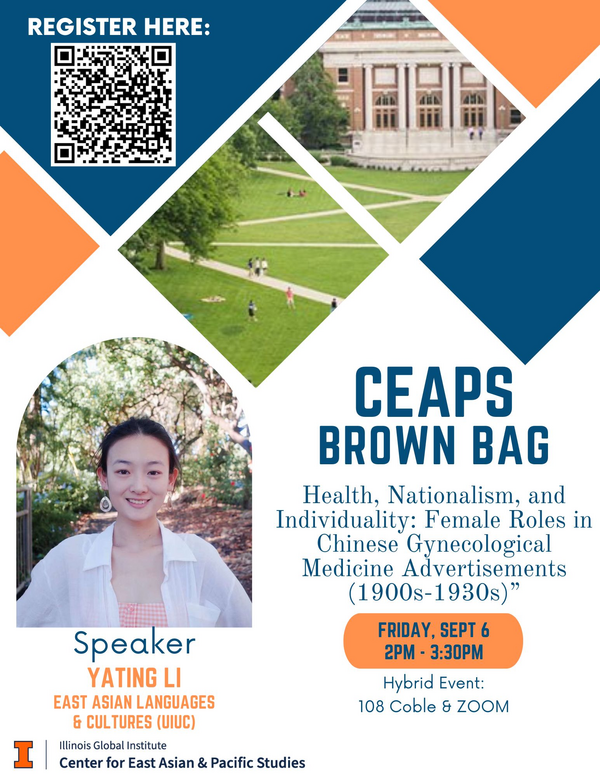
CEAPS Brown Bag | Yating Li "Health, Nationalism, and Individuality: Female Roles in Chinese Gynecological Medicine Advertisements (1900s-1930s)"
- Event Type
- Seminar/Symposium
- Sponsor
- The Center for East Asian and Pacific Studies
- Location
- 108 Coble Hall, 801 S Wright St, Champaign, IL 61820
- Date
- Sep 6, 2024 2:00 pm
- Speaker
- Yating Li
- Registration
- Registration
- Contact
- Alex Chun
- park387@illinois.edu
- Views
- 196
- Originating Calendar
- CEAPS Events Calendar
* Room change: This talk will be held in Room 108 on the first floor of Coble Hall.
About the Speaker:
Yating Li is a Ph.D. student in the Department of East Asian Languages and Cultures at the University of Illinois, Urbana-Champaign. Her academic background includes modern Chinese history and gender studies, with a primary focus on the intersection between gender and medicine. Her recent project explores the social history of preventing, diagnosing, and treating cervical cancer in modern China.About the Event:
In early twentieth-century China, a series of national crises ignited an urgent need for a strong nation and citizens in society. Reformers sought to eliminate traditional backwardness to rescue China from Western aggression and ensure Chinese modernism. Consequently, women, viewed as less educated and less healthy, were considered a critical source of backwardness that needed to be transformed. The flourishing newspaper industry played a crucial role in this transformation, emphasizing the importance of individual health, with women’s bodies as a central focus. To better understand social perceptions of women’s health, this study examines how gynecological medicine advertisements from the 1900s to the 1930s promoted their products. Previous research on women’s health in Republican China mainly highlighted the critical role of childbirth in understanding and transforming women’s bodies. This paper argues that these advertisements represented diverse social expectations of women as healthy, modern, and patriotic citizens, not just mothers. By focusing on commercial advertisements, the study explores the tension between national demands and women’s interests. The popular discourse on women’s health extended beyond reproductive health, including roles as modern females in the new world, responsible mothers in nuclear families, patriotic consumers in the market, and contributors to building the modern nation-state. – so what? The different roles indicated the diverse social perceptions – women’s health is not just about reproductive health.